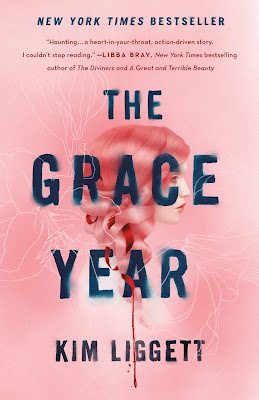I can't remember when I first heard about Grace Year by Kim Liggett. I think I might have heard a review on YouTube. In any case, when I first heard the plot summary for it, I was instantly intrigued. It sounded like Handmaid's Tale for young adults, which should be right up my alley. As usual, I bought a copy but then stuck it on my shelf and ignored it for years. I made it part of my 22 in 2022 Challenge this year so I could finally get around to reading it.
The story is set in a society where women are viewed a wives first and people second. They have no rights and are the property of their husbands; their sole purpose is to produce offspring, preferably sons. The population is very superstitious, believing that young girls are capable of magic that can be used to ensnare men or cause other kinds of trouble. To prevent this, they make all young women that turn sixteen participate in a ritual called the "grace year." The ritual consists of being sent away to a remote camp in the woods for an entire year. The thought is that when the girls return to the village, they will have burned all their dangerous magic off and be ready for marriage. Many don't return at all, succumbing to the harsh conditions and other dangers in the woods. It is a brutal custom, and the townspeople are forbidden to speak of it in casual conversation. What exactly happens there is shrouded in secrecy, but the women of the village all return haunted from the experience.
As the story begins, a young girl named Tierney is about to embark on her own grace year with a group of other young girls. She is different from most of the other women in the village. She has no desire to be a wife and no interest in a life of homemaking. She prefers to be outside, working with her hands, and enjoys whatever independence she is able to carve out for herself. She also rejects a lot of the town's superstitions and is relentlessly curious about the grace year, but as it's forbidden to speak of it, all she has heard are whispered rumors. She's determined to survive it though, and possibly help support the group through it.
When she arrives at the camp with the other girls, however, she quickly realizes that surviving the grace year is no simple matter of sharing her wilderness survival skills. Complex social structures emerge almost immediately, and Tierney quickly finds herself on the outside of the group by refusing to believe in the magic they are supposed to possess. To make matters worse, something strange does appear to be going on with the girls; some bizarre and frightening behaviors start to manifest shortly after they arrive, and it's impossible to determine if its a symptom of their trauma or really some kind of supernatural occurrence. In order to make it back home, Tierney must figure out how to break the girls free from the toxic ideas they've been indoctrinated with since birth and teach them to work together.
I thought this book was pretty good and I enjoyed reading it. Liggett's writing was suitably dark and creepy, matching the subject matter well, and the society she created was downright frightening. As with any dystopian novel, it contained snatches of real world issues driven to their extremes. In Tierney's world, women are placed into arranged marriages by their fathers and judged solely on their obedience and their ability to bear children. I couldn't help but draw some parallels to the current situation with abortion rights being whittled away in the U.S. Could women losing more and more rights over time lead us to a society like this one? It's chilling to think about, and I think it's good for young adult readers to grapple with questions like these.
The themes in the book centered around human rights, independence, thinking for yourself, and the power of working together, which are all very worthy ideas to explore. The journey of Tierney and the rest of the girls was a sad one, but it was ultimately one of hope. The way Liggett spoke up for women's rights while weaving in these universal ideas that are important for everyone to understand was excellent, and the plot of her story drew much-needed attention to the troubles women have faced throughout history and could face again one day if their rights continue to be eroded away. For those reasons alone, I rated the book at four stars.
It wasn't a perfect read though, and what held it back for me was the ending. I think the story should have been left a bit more ambiguous, with the girls returning from their grace year back to the village to face an uncertain, but different, future. Unfortunately, however, the story continues on for a bit and reveals something that I thought was too convenient and unrealistic. It didn't feel quite right to me after the gritty reality of the rest of the story.
Ending aside though, The Grace Year was an interesting read about an important topic. I think young adult readers will enjoy thinking about the big ideas in its pages and connecting bits and pieces of it with our real world. I'm glad I finally took the time to give it a try.




No comments:
Post a Comment
So, what do you think?